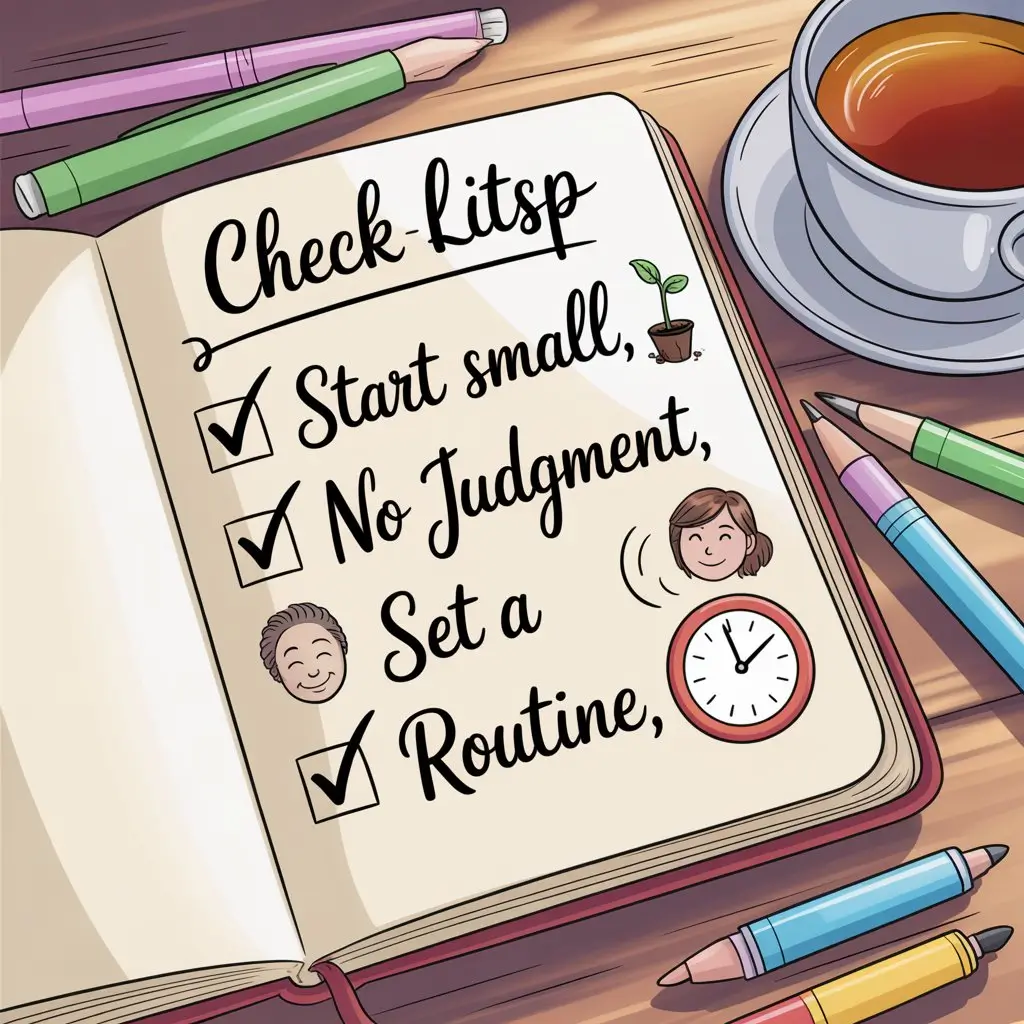Introduction
Journaling has long been recognised as a powerful tool for enhancing mental health and emotional well-being. By putting thoughts and feelings onto paper, individuals create a safe, private space to process emotions, gain clarity, and foster self-awareness. Despite its many benefits, many people struggle to start or maintain a consistent journaling practice. Common challenges such as perfectionism, lack of time, or uncertainty about what to write can quickly undermine motivation and lead to frustration.
This article explores these common barriers and offers practical, actionable strategies to help you overcome them. Whether you’re new to journaling or looking to rekindle your habit, the guidance provided here will empower you to start and sustain a routine that supports your mental health journey easily and confidently.
Understanding the Benefits of Journaling for Mental Health
Journaling is a well-supported mental health practice that offers a range of psychological and emotional benefits. Writing regularly about thoughts and feelings provides a safe, private outlet to process emotions, which can reduce mental distress and improve overall well-being. Research shows that journaling helps manage anxiety, depression, and stress by allowing individuals to organise chaotic thoughts and release pent-up emotions, leading to greater mental clarity and emotional resilience.
Remote researchers have found that journaling reduces the symptoms of both anxiety and depression. For example, studies have found that expressive writing interventions can decrease anxiety symptoms by up to 9% and depression symptoms by around 2%, demonstrating their potential as an effective complementary tool in mental health care. Beyond emotional relief, journaling also supports coping with stressful events, potentially preventing burnout and chronic anxiety by helping people prioritise problems, identify triggers, and develop constructive respon
Moreover, journaling enhances emotional awareness and mood regulation. It promotes self-reflection, fostering positive self-talk and reducing negative thought patterns, contributing to improved self-confidence and emotional control. Physiologically, journaling has been associated with lowered blood pressure, improved immune function, and better sleep quality, further underscoring its holistic impact on mental and physical health.
In summary, journaling is a versatile, accessible practice that supports mental health by helping individuals process emotions, reduce stress and anxiety, and build emotional resilience. Its scientifically validated benefits make it a valuable tool for anyone seeking to improve their emotional well-being and manage mental health challenges effectively.

Common Barriers to Starting and Sustaining a Journaling Practice
Despite its proven benefits, many people face significant obstacles when trying to begin or maintain a journaling habit for mental health. Understanding these common barriers is the first step toward overcoming them and making journaling a sustainable part of your self-care routine.
Perfectionism and Fear of Judgment
Many hesitate to journal because they worry about the quality of their writing or fear that their thoughts might be judged, even if the journal is private. This can create pressure to write “perfectly,” which stifles authentic expression and leads to avoidance. Recognising that journaling is a judgment-free zone where grammar, spelling, and style don’t matter can help reduce this barrier.
Lack of Inspiration or Uncertainty About What to Write
Not knowing what to write or feeling uninspired is a common challenge. This can lead to writer’s block or frustration, especially for beginners. Using prompts focused on emotions, gratitude, or goals can provide guidance and spark ideas, making it easier to start writing even on low-motivation days.
Time Constraints and Busy Schedules
Many people feel they don’t have enough time to journal, viewing it as an additional task in an already packed day. However, even short sessions of 5 to 10 minutes can be effective. Integrating journaling into existing routines, like during morning coffee or before bed, can make it more manageable.
Fear of Vulnerability and Emotional Overwhelm
Journaling often involves confronting difficult feelings, which can be intimidating or overwhelming. This fear can prevent people from starting or cause them to stop journaling. Starting with lighter or neutral topics and gradually working toward deeper reflections can ease this discomfort. Emotions can be handled better if you work on grounding and limit your therapy sessions to specific times.
Misconceptions About How Journaling Should Be Done
Some believe journaling requires a specific format, routine, or style, which can create unnecessary pressure. When blogging becomes strict and predictable, it may prevent you from being flexible and stop it from helping. Understanding that journaling can be personalised, whether through free writing, bullet points, doodles, or structured prompts, allows for a more enjoyable and sustainable habit.
By identifying these barriers, you can begin to adopt practical strategies that address each challenge directly, making journaling a more accessible and rewarding tool for mental health.
Practical Strategies to Overcome Barriers
Overcoming the common obstacles to journaling requires practical, actionable strategies tailored to address specific challenges. Here are effective approaches to help you start and sustain a journaling habit that supports your mental health journey.
Addressing Perfectionism and Fear of Judgment
- Embrace Imperfection: Remind yourself that journaling is a private, personal practice with no rules about grammar, spelling, or style. The goal is expression, not perfection.
- Free Writing: Don’t stop writing just to judge or revise your thoughts. Because thoughts come out as they are, writers rarely need to censor themselves.
- Reframe Negative Thoughts: Replace self-critical thoughts with affirmations like “My journal is my safe space” or “It’s okay to write imperfectly.”
Finding Inspiration and Structure
- Use Prompts: The first question is, “How am I feeling currently?,” and then “What do I appreciate today?” You may want to use a prompt to get you started if you’re feeling stuck.
- Experiment with Styles: Explore different journaling formats, bullet points, lists, letters to yourself, or even doodles, to find what feels most natural and enjoyable.
- Incorporate Mindfulness: Begin your journaling session with a brief mindfulness exercise to tune into your emotions and thoughts, making writing more focused and meaningful.
Managing Time Constraints
- Start Small: Commit to just 5 minutes a day or write a few sentences. Small, consistent efforts build momentum without feeling overwhelming.
- Set a Timer: Use a timer to create a clear, manageable journaling window, helping you stay focused and reducing procrastination.
- Integrate into Routine: Pair journaling with an existing habit, like morning coffee or bedtime, to make it a seamless part of your day.
Creating a Comfortable and Consistent Routine
- Choose Your Medium: Select a journaling method that appeals to you, whether a traditional notebook, a digital app, or even voice notes, to increase engagement.
- Designate a Space: Find a quiet, comfortable spot that invites reflection and writing, helping to create a positive association with journaling.
- Develop Rituals: Small rituals, like lighting a candle or playing soft music, can signal your brain that it’s time to journal and boost motivation.
Overcoming Fear of Vulnerability
- Remember Privacy: Let your student know you’ll be the only one reading their journal which will make it comfortable for them to express themselves honestly.
- Start Light: Begin with less intense topics or positive reflections before gradually exploring deeper emotions.
- Seek Support if Needed: Combine journaling with therapy or counseling if you find certain emotions too difficult to process alone.
By applying these strategies, you can break through common barriers and cultivate a journaling practice that feels manageable, meaningful, and supportive of your mental health.

Tips for Sustaining the Journaling Habit
Building a journaling habit is one thing; maintaining it over time is another. Consistency is key to reaping the long-term mental health benefits of journaling. Read on for valuable tips on how to keep your journaling habit going and become a regular part of your self-care.
Be Authentic and Honest
Authenticity is the heart of effective journaling. Write honestly about your feelings, thoughts, and experiences without censoring yourself. This genuine self-expression deepens self-awareness and emotional healing, making journaling more rewarding and motivating.
Reflect on Your Progress
Routinely check your journal to spot trends, notice any improvements in your feelings, and see where you have changed. Reflecting on your progress can boost motivation by highlighting how journaling has helped you cope and evolve.
Allow Flexibility and Self-Compassion
Avoid rigid expectations about journaling frequency or length. There will be times when you are busy and can’t write as much as usual. Be kind to yourself and view journaling as a supportive tool rather than a chore. Flexibility reduces pressure and helps prevent burnout.
Mix It Up
Keep your journaling practice fresh by trying different techniques, such as gratitude lists, goal-setting, creative writing, or drawing. Experimenting with styles can rekindle interest and prevent the habit from becoming monotonous.
Pair Journaling with Other Mental Health Practices
Combine journaling with complementary activities like mindfulness meditation, therapy, or physical exercise. This holistic approach enhances your overall well-being and reinforces the benefits of journaling.
Set Reminders and Use Tools
Use phone reminders, journaling apps, or physical planners to prompt regular writing sessions. Having a cue can help establish routine and reduce forgetfulness.
By incorporating these tips, you can nurture a sustainable journaling habit that supports your mental health journey, helping you grow emotionally and maintain resilience through life’s challenges.
Conclusion
Journaling is a powerful and accessible tool for supporting mental health, offering a private space to process emotions, gain clarity, and foster self-awareness. While many face barriers such as perfectionism, lack of time, or fear of vulnerability, practical strategies can help overcome these challenges and make journaling a sustainable habit. By starting small, embracing imperfection, using prompts, and creating a comfortable routine, anyone can harness the benefits of journaling.
Moreover, journaling can complement other mental health practices, including therapy, by deepening emotional exploration and tracking progress. Regular reflection on journal entries helps identify patterns and triggers, empowering individuals to make positive changes and build resilience.
Ultimately, the key to success is to approach journaling with kindness and flexibility, allowing it to evolve naturally as a supportive tool on your mental health journey. With persistence and the right mindset, journaling can become a transformative practice that nurtures emotional well-being and personal growth.




